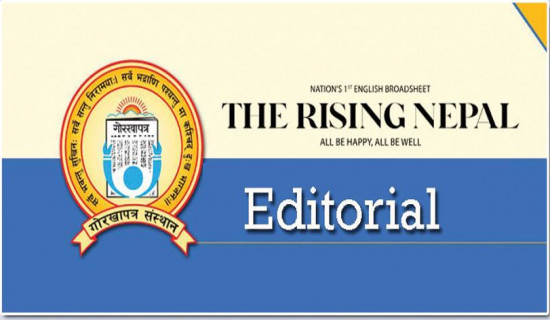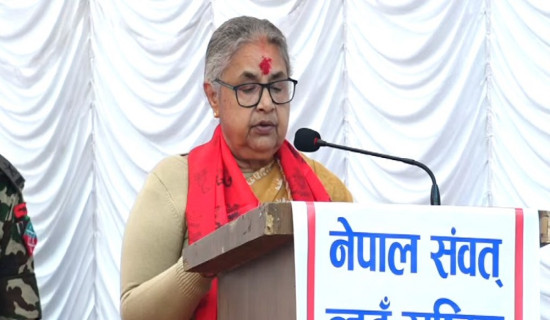- Wednesday, 22 October 2025
Stability For Prosperity
Despite scores of democratic movements launched to meet the aspirations of the Nepali people, the country continues to suffer from volatile political situation, which bears negative ramifications for governance, order and development. Behind every political upheaval, there lie the people’s aspirations for effective delivery of goods and services. But there is a vast gap between the promises of revolution and performance of the leadership that tend to surface on the back of movements. As the leaders fail to consolidate the achievements, the desired level of social and economic progress does not take place, giving rise to public frustration and disenchantment. Politics is expected to benefit the common people but when their genuine concerns for livelihood, security, dignity and happiness remain far from addressed and delivered, they show a sense of displeasure towards the government and system of governance.
It is a big paradox that no government has completed its full five-year tenure since the country adopted the democratic system in 1950. There was a big hope of stability after the promulgation of new constitution in 2015. But even the government with near two-thirds majority, which was formed after the historic elections of 2017, could not sail smoothly. The dissolution of the House of Representatives twice virtually put the national politics on slippery slope. There was no end to instability as expected by the people. The three-tier polls, held last year, gave a hung parliament, impelling parties represented in the federal parliament to form a coalition government. Within two months of formation of present government, some parties quit it and others came to back it. The country is set to elect a new president within a week, which is expected to start new political course.
Political and economic experts, who talked on the downsides of instability with this daily, have said that it hurts the economic activity, with the workers losing interest in their work, development agencies sensing lack of harmony in policies and irregularities getting breeding ground in different segments of government. Political uncertainty naturally affects the needed focus to resolve economic woes the nation is facing and achieve growth. There is the challenge to complete development projects in time with spending of capital budget showing meagre performance. Development is a continuous process that requires predictable policy and programmes. Lack of jobs to parliament cause delays in passing vitals Bills related to finance, foreign trade, public procurement, customs and civil services, among others.
Concerned officials have assured that political instability does not affect the budget allocations for the pride projects. But the bitter truth is that frequent government changes can cause disruption in policy formulation, project implementation and institutionalisation of the political system the nation has adopted. This will cause the people to lose trust in the credibility and capability of the leadership in fulfilling the commitment they made during the elections. Internal factors are largely blamed for continuous instability. Some observers claim that geopolitical elements have their role for the fluid political condition but actually they have no bigger hand in shaping the domestic politics. External factors may try to have their influence but coherent policy and internal unity sill be able to foil such intentions of meddling. The political parties should developed common ground on economic policy and foreign relations. If they are guided by unified position for the social, economic and cultural causes, political instability is unlikely to surface repeatedly.

















